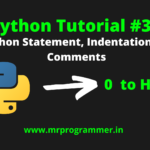Introduction
Java, one of the most popular and versatile programming languages has been an essential part of software development for over two decades. If you’re considering a career as a Java Developer, you’re on the right track. In this comprehensive guide, we will go through the steps to become a proficient Java developer.
Also Read: OOPS Concepts In Java | Object-Oriented Programming In Java
Table of Contents
How to Become a Java Developer
Step 1: Learn the Basics of Programming
Before directly diving into Java, It’s important to understand the fundamentals of programming. You can start with any of the programming languages like Python, JavaScript, or even C++ to get a basic idea about programming and Learning Concepts like variables, data types, control structures (loops and conditions), and functions that will give you a solid foundation in programming and you will be ready to proceed further with Learning Java.
Step 2: Set Up Your Development Environment:
To write and run Java code, you’ll need a development environment. Begin by installing the Java Development Kit (JDK) on your computer. The JDK includes essential tools like the Java compiler and the Java Virtual Machine (JVM). You can download the latest JDK from the official Oracle website or choose an open-source alternative like OpenJDK.
Step 3: Master the Basics of Java
To Learn Java Well, you should begin with the basics first. Here are the following concepts that you can consider learning:
- Syntax: Java has a unique syntax; make sure to understand concepts like classes, methods, variables, and data types.
- Object-Oriented Programming (OOP): Java is an object-oriented language, so learn about classes, objects, inheritance, polymorphism, and encapsulation.
- Collections: Familiarize yourself with collections like lists, sets, and maps to manage data efficiently.
Step 4: Practice Regularly
Regularly Practicing is a best best way to learn Java Well. Write simple Java programs to reinforce what you’ve learned. Challenge yourself with exercises and small projects. There are different platforms available that you can go for that will help you improve.
Step 5: Learn About Input and Output
Understanding input and output is crucial. Learn how to read user input from the console and display results. You’ll use these skills in virtually every Java application.
Step 6: Study Exception Handling
Java is known for its robust exception handling. Learn how to deal with exceptions gracefully using try-catch blocks. This skill is vital for writing reliable and resilient software.
Step 7: Dive into Java Libraries
Explore Java’s Standard Libraries (also known as the Java Standard Library Or Java API.) These libraries provide pre-written code for common tasks like file handling, networking, and more. Be Familiar with key classes and methods in Java.
Step 8: Explore Database Connectivity
In real-world applications, data is often stored in a databases. Learn how to connect Java applications to databases using technologies like JDBC (Java Database Connectivity). You’ll need this skill to interact with databases and retrieve or update data.
Step 9: Web Development with Java
If you’re in web development, Java offers several options. Servlets and JavaServer Pages (JSP) are essential technologies for building web applications. You can also work on modern web frameworks like Spring or JavaServer Faces (JSF).
Step 10: Get Comfortable with Debugging
Becoming proficient at debugging is crucial for any developer. Learn how to use debugging tools provided by your Integrated Development Environment (IDE) or command-line tools like the Java Debugger (JDB).
Step 11: Version Control with Git
Having the knowledge of Version Control System (VCS) is an integral part of software development. Be Familiar with VCS platforms like Git, a popular version control system. Learn how to create repositories commit changes, and collaborate with others on projects.
Step 12: Build Projects
To get hands-on experience, build small projects that suit you. Whether it’s a simple command-line utility, a web application, or a mobile app using Java for Android development, projects will combine with your knowledge and showcase your skills.
Step 13: Learn About Design Patterns
Design patterns are reusable solutions to common problems in software design. Studying design patterns will help you write cleaner, more maintainable code. Some common design patterns in Java include Singleton, Factory, and Observer.
Step 14: Keep Learning and Stay Updated
The tech world is constantly evolving. Stay up-to-date with Java updates, new features, and best practices. Join online communities like Stack Overflow to seek help and share your knowledge.
Step 15: Prepare For Interviews
When you feel confident in your Java skills, start preparing for interviews. Be ready to discuss your projects, and problem-solving abilities, and demonstrate your understanding of Java concepts.
Step 16: Continuous Improvement
Becoming a Java developer is not a destination, it’s a journey. Keep refining your skills, learning new technologies, and adapting to industry changes. This will ensure a long and successful career in Java development.
Conclusion
Becoming an efficient Java developer can be quite challenging but with dedication and continuous learning. By mastering the basics, practicing regularly, building projects, and staying updated, you can become a proficient Java developer.
- Introduction to Entrepreneurship: Everything You Need to Know Before You Start - June 12, 2025
- What Sets Artificial Intelligence Apart from Humans? - April 18, 2025
- Python Programming: A Comprehensive Guide for Beginners - March 27, 2025









One comment